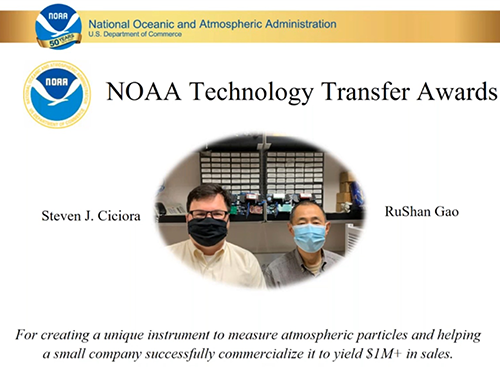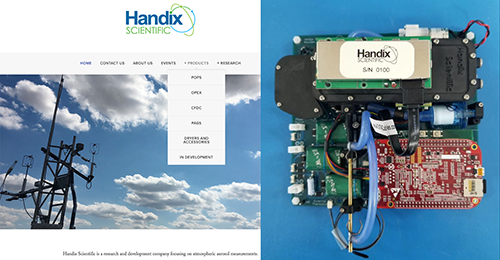A .gov website belongs to an official government organization in the United States.
A lock () or https:// means you've safely connected to the .gov website. Share sensitive information only on official, secure websites.
29 October 2020

CSL scientist Ru-Shan Gao and CSL engineer Steve Ciciora receive a NOAA Technology Transfer Award for "for creating a unique instrument to measure atmospheric particles and helping a small company successfully commercialize it to yield $1M+ in sales." In addition, Laurel Watts, Rich McLaughlin, Troy Thornberry, and Hagen Telg (GML) were nominated by NOAA OAR and receive a Cooperative Institute for Research in Environmental Science (CIRES) Bronze Medal for this achievement.
To assess effects of aerosol on climate and air quality, this team built the Portable Optical Spectrometer (POPS), a novel aerosol sensor of science quality that is small, light, robust, and suitable for many platforms. They transferred the technology to Handix Scientific in 2015, and helped that company to successfully commercialize the instrument.
Atmospheric aerosols play many important roles in the environment. Consisting of microscopic particles suspended in the air, aerosols scatter and absorb sunlight thereby exerting direct effects on climate and reducing visibility. Aerosols also affect cloud formation, lifetime, and optical properties, resulting in indirect climate effects. In addition, aerosols provide surface sites for heterogeneous chemical reactions and negatively impact human health. Understanding the sources and consequences of these aerosols requires accurate size-resolved measurements of aerosol particle concentrations.

The Printed Optical Particle Spectrometer (POPS), later renamed as Portable Optical Particle Spectrometer, was invented in CSL to address the need of low cost, portable aerosol instrument for scientific research. POPS is about 10 times smaller and lighter than commercially available science-grade aerosol instruments, yet almost as sensitive. The extreme robustness and portability allow it to be used for sounding and drone applications. The technologies of manufacture, calibration, and operation of the POPS instrument were licensed to Handix Scientific in this technology transfer.